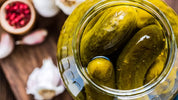
Are Pickles Good for You?
, by saikat dutta, 3 min reading time

, by saikat dutta, 3 min reading time
Pickles have been a favorite snack and side dish for centuries, but many people wonder, are pickles good for you? The answer depends on how they are made, their ingredients, and how they fit into your overall diet. In this blog, we will explore the health benefits and potential risks of pickles to help you make an informed choice.
.jpg)
Pickles are typically made from cucumbers, vinegar, salt, and various spices. Some pickles are fermented, while others are simply preserved in vinegar. Their nutritional value varies depending on the preparation method. But generally, they contain:
Low Calories – A single pickle contains very few calories, making it a guilt-free snack.
Probiotics – Fermented pickles are rich in probiotics, which support gut health.
Vitamins & Minerals – They provide small amounts of vitamin K, calcium, and potassium.
Sodium – Most pickles are high in sodium, which can be a concern for some individuals.
Fermented pickles contain probiotics that improve gut health by promoting the growth of good bacteria. If you have digestive issues, adding probiotic-rich pickles to your diet may be beneficial.
Pickles contain antioxidants, including vitamin C and beta-carotene, which help fight free radicals and reduce inflammation in the body.
Due to their high water content and sodium levels, pickles can help replenish electrolytes, making them a great option after intense physical activity.
Some studies suggest that vinegar-based pickles may help regulate blood sugar levels by improving insulin sensitivity.
Pickles contain vitamin K, which plays a crucial role in bone health and blood clotting.
While pickles offer several health benefits, they also have some downsides:
The biggest concern with pickles is their high sodium content. Too much salt can lead to high blood pressure and water retention.
Vinegar-based pickles are acidic and can cause acid reflux or damage tooth enamel when consumed in excess.
Some store-bought pickles contain artificial preservatives and colorings, which may not be good for long-term health.
To maximize the benefits and minimize the risks, follow these tips when selecting pickles:
Opt for Fermented Pickles – These are rich in probiotics and have additional health benefits.
Check the Sodium Levels – Choose low-sodium options to reduce salt intake.
Avoid Artificial Additives – Read ingredient labels and avoid pickles with artificial preservatives and colors.
Make Your Own Pickles – Homemade pickles allow you to control the ingredients and ensure they are healthy.
So, are pickles good for you? The answer is yes, but with some caution. If consumed in moderation, pickles can be a tasty and nutritious addition to your diet. Choose fermented varieties for probiotics, keep an eye on sodium intake, and avoid artificial additives to enjoy their benefits while minimizing risks.
By making smart choices, you can enjoy pickles as part of a balanced diet while reaping their potential health advantages!


